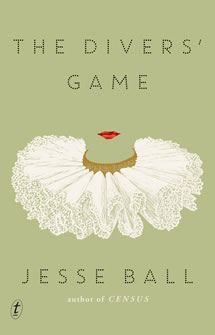Reviewed by Robert Goodman.
By Jesse Ball, Text, $24.99.
 Jesse Ball enters the dystopian fray with his latest book The Divers’ Game. The book is a series of loosely connected short stories set in a dystopian future. In order to set these up, there is a lengthy info dump, in the form of a lecture in the first chapter. After that, Ball frees himself to explore the world that he has created.
Jesse Ball enters the dystopian fray with his latest book The Divers’ Game. The book is a series of loosely connected short stories set in a dystopian future. In order to set these up, there is a lengthy info dump, in the form of a lecture in the first chapter. After that, Ball frees himself to explore the world that he has created.
The world that Ball creates is one of absolute haves and have nots. It is a world in which fairness is no longer a yardstick:
As much as we like to think there can be fairness, it is really a foolish idea, one we ought to have done away with long ago. Instead of fairness there is just order and its consequences.
As part of this order, at some point in the past all refugees were tattooed and sent to live in walled communities. Soon after, the government decided to do away with prisons and sent all prisoners to live in the same communities. This followed a change in philosophy such that nothing done to those “beneath” is considered to be violence:
It was a new definition of violence, and helped create a vibrant morality… But if what we do ceases to be violence, let us say it is the same, but is no longer violence: then we are not violent, we are no longer doers of violence.
The logical endpoint of this is that the “haves” carry gas masks and cans of poison gas. They are trained from birth that when in danger they can put on the gas mask and use their gas canister to kill whoever is threatening them. They are condition to believe that this is not violence, but part of the natural order.
In this world, Ball then tells a number of related by distinct stories mainly about children and teenagers– of a visit to a zoo in which all of the animals except one have now died, of a privileged girl lost in a bad part of town, of a little girl who will be the figurehead in a bacchanalian parade and a boy who participated in the dangerous divers’ game. Ball ends with a lengthy suicide note, reflecting on the human cost of this new social order.
Much like his last book Census, while Ball has created a dystopia, his world is more along the lines of a thought experiment or extended metaphor. He is less interested in the political structures and more about the potential extremes of human behaviour when the fundamental underpinning of society is taken away. None of these pieces resolve, they all leave the reader hanging uncomfortably, imagining what might come next. This just serves to increase their power.
By focussing on young people, Ball reveals his world through the eyes of characters who do not question its validity. They have been brought up in it and so intrinsically understand it. Only in the last story does he give the perspective of a character who sees things from a remove, who questions the status quo. Although even this questioning does not seem to have impacted the person to whom the letter is addressed who has made an appearance earlier and his unwavering belief in the system.
Ball uses the dystopian mode to deliver short, disturbing pieces of fiction, that cut to the heart of our humanity. In The Divers’ Game, Ball has delivered another gem.











